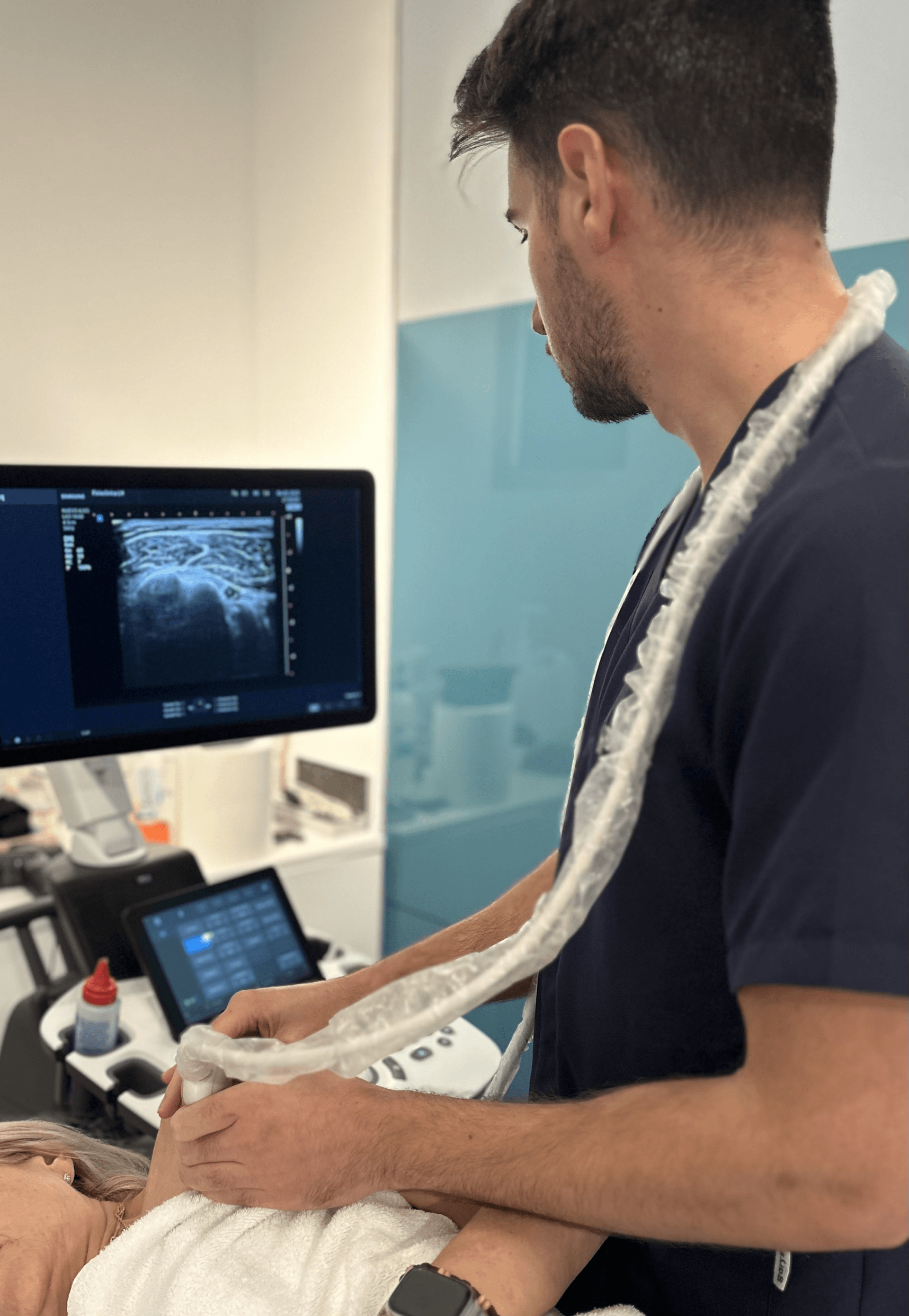Painful shoulder
Shoulder pain is the third musculoskeletal pathology received in consultation after low back pain and knee pain. Between 60-70% of adults experience shoulder pain at some point in their lives.
Painful shoulder is of multifactorial origin, although it is associated with sports and work activities in which repetitive gestures are performed, where anatomical structures are subjected to mechanical stress and therefore wear them out.
That is why at FisioclinicaLH we have specialized and have in-depth knowledge in the assessment and treatment of shoulder injuries. The evaluation with ultrasound is essential to know which tissue is affected and to be able to prescribe a treatment according to the lesion.
What shoulder injuries do we treat?
• Bursitis
• Adhesive capsulitis or frozen shoulder
• Rotator cuff tear
• Rotator cuff tendinopathy
• Calcifying tendinopathy
• Acromioclavicular dislocation
• Osteoarthritis
• Labral breaks (SLAP)
• Unstable shoulder
• Glenohumeral dislocation
• Rotator cuff surgery rehabilitation
• Shoulder surgery rehabilitation
• Fracture rehabilitation

What treatments do we perform?
For shoulder injuries it is essential to carry out a comprehensive treatment, that is, with physiotherapy through manual therapy, electrolysis, shock waves and neuromodulation; In some cases, ultrasound-guided infiltrations carried out by a specialist in sports and regenerative medicine that will help speed up the recovery process and speed up recovery times; And last but not least, the exercise to readapt the injured structure to the demands required in sports activities and in daily life.
Frequently asked questions - painful shoulder
What are the most common causes of shoulder pain?
Shoulder pain can result from various causes, with the most common being:
- Bursitis: Inflammation of the bursa, a small fluid-filled sac that cushions the joint.
- Tendinopathies: Conditions affecting the rotator cuff tendons, such as tendinitis or calcific tendinopathy.
- Adhesive capsulitis (frozen shoulder): Stiffness and pain in the shoulder joint.
- Traumatic injuries: Such as acromioclavicular or glenohumeral dislocations.
- Osteoarthritis: Wear and tear of the joint cartilage.
These conditions are often associated with sports or occupational activities that involve repetitive shoulder movements.
How is shoulder pain diagnosed?
Shoulder pain is diagnosed through a detailed clinical evaluation and imaging tests. Ultrasound is particularly useful for identifying the affected tissue and determining the appropriate treatment.
What treatments are effective for shoulder pain?
The treatment for shoulder pain is typically comprehensive and may include:
- Physiotherapy: Manual therapy, electrolysis, shockwave therapy, and neuromodulation.
- Ultrasound-guided injections: Performed by a specialist to speed up recovery.
- Therapeutic exercise: To adapt the injured structure to daily and sports-related demands.
How long does it take to recover from a shoulder injury?
Recovery time varies depending on the severity of the injury and the treatment applied. Some injuries may improve within weeks, while others, particularly those requiring surgery, may take months for full recovery.
Is surgery necessary to treat shoulder pain?
Not all shoulder injuries require surgery. Many can be effectively treated with conservative therapies such as physiotherapy and rehabilitation. The decision to undergo surgery depends on the nature and severity of the injury, as well as the response to non-surgical treatment.
What exercises are recommended to prevent shoulder pain?
Performing strengthening and stretching exercises for the shoulder muscles can help prevent injuries. Focus should be on the rotator cuff and scapular muscles. Consulting a physiotherapist is recommended to develop an appropriate routine.
How can I relieve shoulder pain at home?
To relieve shoulder pain at home, you can try:
- Rest: Avoid activities that worsen the pain.
- Ice or heat application: Depending on the stage of the injury.
- Over-the-counter pain relief: Such as paracetamol or ibuprofen.
- Gentle mobility exercises: To maintain flexibility.
It is essential to consult a healthcare professional before starting any treatment.
